Education
What Going Back to School looks like in Gwinnett County and around Peachtree Corners
Published
5 years agoon
By
Kelsey Asher
In past years, the biggest worries most kids had in going back to school were if they had the coolest shoes, the right school supplies, and the best class schedule. But in the wake of Covid-19, schools are having to get creative and flexible to provide quality education in a safe and socially distanced environment. The adaptive educational approach may differ in private and public schools, some offering in-person instruction with specified health precautions or a digital learning alternative.
Gwinnett County Public Schools (GCPS)
Gwinnett County Public Schools (GCPS) is scheduled to open August 12 in a 100 percent digital format, and the reopening strategy has gone through several revisions. The most recent changes were announced on August 4, which can be read about on the GCPS website and more below.
GCPS School Board Revisions
Increased political pressure and reports of a surge in Covid-19 cases put GCPS in a tough spot regarding reopening school. On July 20, CEO/Superintendent J. Alvin Wilbanks announced that GCPS would open the 2020-21 school year on August 12 with all students receiving digital instruction.
“There is no replacement for face-to-face instruction, and that was our preferred model for next year,” said Wilbanks in a press release. “With that in mind, we offered parents an option between in-person and digital instruction in order to be responsive to their wishes for their children. However, out of an abundance of concern for our students, families, and employees, we made a very difficult decision based on the increasing number of COVID-19 cases we are seeing in our county, as well as the concerns that have been expressed by our teachers, parents, and others in the community.”
A questionnaire was sent out to parents in mid-June. It found that 43 percent of parents surveyed preferred return to in-person instruction, 34 percent preferred completely digital learning, and 23 percent preferred an option that combines in-person instruction with digital learning. Many parents have publicly called for an in-person option, which has resulted in additional opening revisions.
On August 4, Wilbanks shared plans for transitioning to a blend of in-person and digital learning for students, based on their parents’ choices. GCPS plans to begin small, bringing in a limited number of grade levels at first, then adding more grades on a staggered basis. Mr. Wilbanks’ letter to stakeholders shared that the schedule found below is a best-case scenario, and student and staff safety will be the paramount factor in determining the pace at which the district will move.
Digital Instruction begins for all students on August 12
Framework for Implementing Parents’ Choice of In-Person Instruction for their Students
| Starting Date | Elementary School Grades | Middle School Grades | High School Grades | Special Education |
| August 12 | All grades digital | All grades digital | All grades digital | All classes digital |
| August 26* | K and 1st gradein person | 6th grade in person | 9th grade in person | All self-contained classes in person** |
| September 2* | K, 1st, 2nd, and 3rd grades in person | 6th and 7th grades in person | 9th and 10th grades in person | All self-contained classes in person** |
| September 9* | All grades in person | All grades in person | All grades in person | All self-contained classes in person** |
* Dates are subject to change depending on the COVID-19 conditions in Gwinnett County at that time. ** Includes students who spend the majority of the day in a small-group setting: Severe/Moderate & Mild Autism; Severe/Profound, Moderate & Mild Intellectual Disabilities; Emotional-Behavioral Disabilities; ADAPT; GNETS; Visual Impairment; Moderate Visual Impairment; Orthopedic Impairment; Significant Developmentally Delayed; Specific Learning Disabilities (self-contained); Deaf/Hard of Hearing; Early Childhood Program (special needs pre-school).
Prior to the announcement of 100 percent digital learning, pre-planning for teachers was already increased five days. In addition to traditional pre-planning activities, this extended pre-planning period will orient staff on COVID-19 prevention protocols, complete schedules for students and teachers for instructional/logistical changes and much more.
Lastly, GCPS cancelled Class of 2020 in-person graduations scheduled for July 13-19.
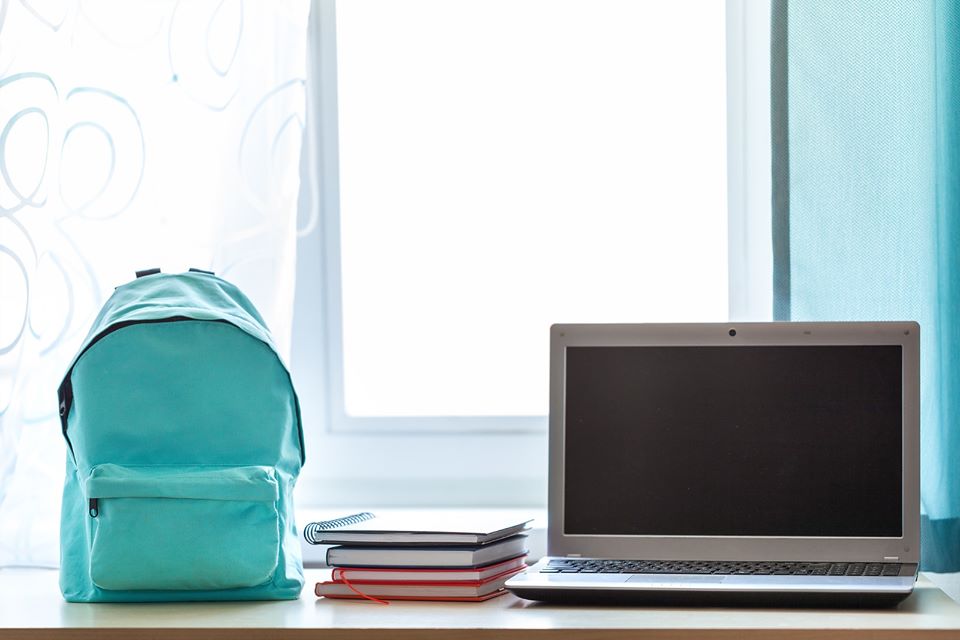
Digital Learning Expections for GCPS Students
- Teachers will provide both live (synchronous) and recorded (asynchronous) lessons and independent work. This means that students will be required to participate in digital instruction on a specific schedule with their teachers (synchronous learning), and complete activities and assignments (asynchronous learning) on their own time to meet deadlines.
- Students will receive quality instruction on all grade-level standards, learning the district’s Academic Knowledge and Skills (AKS) curriculum.
- Instruction and support will be provided by teachers and staff from the student’s local school.
- For the most part, the digital learning day will follow the same operational hours as the usual in-person school day would.
- Students will access assignments through eCLASS C&I course pages, but teachers also may use digital resources such as Google Classroom, SAFARI Montage, etc.
- Students will attend synchronous (live) online sessions with teachers through Zoom, Google Meet, and/or Teams Meet.
- Schools and/or clusters will have standardized processes for where and how assignments are posted and accessed by students.
- Teachers will provide schedules detailing which lessons will be done in synchronous sessions. Synchronous sessions will be recorded. This will allow students and parents to review the sessions and make them available to students who occasionally cannot attend a live session.
- Schools will provide specific information to support students and parents around digital learning processes and protocols.
- Additional student and parent support resources will be available on the district web page and in the student portal.
- The updated GCPS Parent Portal, rolling out in August, will make it easier for parents to see assignments, including missing ones. It also will allow parents to access student information, including gradebook data, discipline, report cards, transcripts, calendars, and more.
- Students will need access to reliable internet and devices. Sharing a device is not recommended. Parent involvement is key to successful digital learning.
Protective Measures in Schools
This is an excerpt of the overview of planned protective measures by GCPS, also outlined on August 4.
- Families should self-screen at home. It is recommended that families take temperatures daily before going to school. Anyone with a fever of 100.4 F or higher should not go to a school site. Students and adults also should screen themselves for respiratory symptoms.
- Students and staff with COVID-19 symptoms or a temperature of 100.4+ will be isolated and sent home.
- All students and employees must stay home if they have COVID-19 symptoms, have been in contact with someone with COVID or have symptoms and are awaiting test results, tested positive, or had close contact with a person with COVID-19 within the last 14 days.
- For those ill, health department guidelines will be followed for return to school/work.
- Frequent handwashing encouraged, with breaks for scheduled handwashing at ES level.
- Ventilation systems monitored for proper operation.
- Buses will be cleaned/disinfected after morning/afternoon routes.
- GCPS is requiring those who attend and/or work at its schools to wear a face-covering or mask to minimize the spread, and keep students and staff members safe. Accommodations will be made for students/employees unable to wear masks for documented health reasons.
- Schools will limit visitors; serve meals in classrooms; stagger lunch, playground, and class-change schedules; and hold meetings/events virtually as possible.
- Where feasible, rooms will be arranged with student desks facing the same direction and students seated at tables will sit on the same side.
- Students will be discouraged from sharing books, materials, supplies, or equipment, including devices and equipment used for athletics/PE.
- Cafeteria keypads will be replaced with a barcode scanning system.
- Students will have access to water but will need to provide their own container.
- Cleaning/disinfecting of buildings, surfaces etc will be done more frequently.
- A distinct set of cleaning/disinfecting protocols will be implemented for situations when someone in a facility tests positive for COVID-19 or exhibits symptoms caused by COVID-19, which includes closing off affected areas.
- Custodians will use only GCPS-approved cleaning products from the list approved for use against the SARS-CoV2 virus.
- The district will provide a box of vinyl gloves, a bottle of Pureforce Food Contact Quat Sanitizer, a bottle of Hillyard Vindicator+ cleaner/disinfectant, and paper towels for each classroom and office, replenishing supplies as needed.
FAQS
There are a number of Frequently Asked Questions coming up in response to GCPS’ announcements, some of which we will share here to elaborate on information already relayed by GCPS.
- Will GCPS require all students and staff to be tested for COVID-19 before school starts? The health department currently does not recommend widespread testing before the start of the school year.
- Will parents be notified if there is a positive case involving a student in their child’s class or bus? Yes, every close contact of a positive case will be notified promptly.
- How will the district handle students who become sick at school? The school clinic will continue to serve students who feel ill at school. Each school will have an area set up (separate from the clinic) for students who have symptoms associated with COVID-19. Students will be socially distanced and monitored in that area while parents are contacted to pick them up. It’s essential that parents are aware that sick students should be kept home and that students who develop symptoms at school must be picked up promptly.
- Will there be social distancing on school buses? No. If the district were to social distance per CDC guidelines, each 72-passenger bus could only transport 12 students at a time. GCPS does not have enough buses or drivers to accommodate this.
- Will the school system be able to offer extracurricular activities and sports? If so, will students who choose digital learning be able to participate? The school district’s ability to continue its sports programs will be determined in large part by Georgia High School Association rules, along with guidance from health officials. If available, students will be able to participate on-site at their schools.
- Will digital learning students be expected to be in front of a computer for six-plus hours a day? It’s not likely that students would be online in live classes the entire school day. Based on feedback, we are encouraging teachers to conduct more live (synchronous) lessons, but with the understanding that occasionally students may not be able to participate at the specified time. Therefore, teachers should record live sessions for students who need to view at a different time.
- Will there be consistent expectations of what digital teaching looks like and how much time students will be engaged in learning? Will teachers receive additional training and support? Teachers did a great job transitioning to digital learning in the spring on short notice. Each week, teachers worked hard to improve their lessons to better engage students while at home. As the school year ended, teachers were eager for more professional learning on digital instruction. All summer, staff development has been focused on improving teachers’ effectiveness in teaching digitally. Teacher participation in these learning opportunities has been strong and we believe students will see the impact daily in their lessons. Multiple resources and supports, such as sample lessons and technology training, are available to all teachers and schools will assure teachers are using these resources as they plan lessons.
- Will digital learners get access to physical textbooks? For many courses, students will be assigned a physical textbook. Local schools will issue these books to all students. Other courses where textbooks are issued in class sets, the district Curriculum and Instruction offices will assist teachers in developing lessons that utilize high-quality resources that can be accessed digitally. Additionally, there will be a limited number of classroom textbooks that can be checked out by students.
- Will there be opportunities for one-on-one attention? Students will be provided opportunities to receive one-on-one attention. Teachers will expect students to follow a specific schedule because after-hours support will be limited.
- Will there be separate teachers for digital and in-person teaching? Principals will staff their schools based on how many students choose digital versus in-person instruction. There may be some teachers (particularly middle and high school levels) who teach both.
- How is the school district addressing internet access issues? GCPS encourages families to take advantage of existing no and low-cost Internet services provided by commercial carriers. The district maintains a list of these providers available on the GCPS website. If your family is unable to make use of one of these plans, contact your local school, which will have a limited number of hotspots available for check out. “In the spring, the school district checked out Chromebooks to families in need and we will continue that this fall,” said Sloan Roach, GCPS Executive Director of Communications and Public Relations.
Ms. Roach also stated in regards to safety guidelines at elementary, middle, and high school levels that GCPS will “emphasize these messages with students and staff at all levels in different ways… signage, announcements, etc.”
Additional Responses from Schools
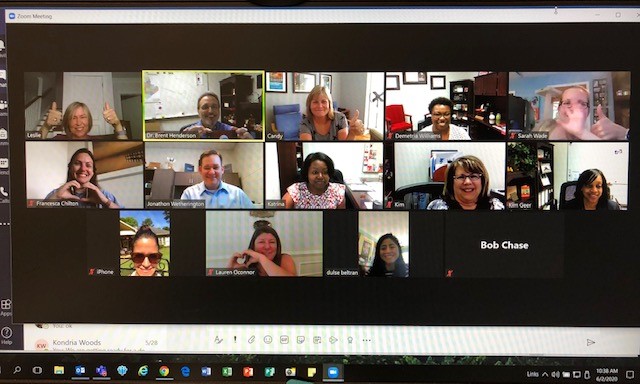
Though every GCPS must follow county guidelines, each individual school might have a slightly altered approach to how that looks in their environment. Paul Duke Stem High School, for example, sent out a special video message to students and parents to help them make the decision that best suits their learning. This was prior to the 100 percent digital announcement and additional revisions.
“At Paul Duke STEM, we want to help our students and families make the best possible decision. This video was recorded by our Principal, Dr. Wetherington to help you in your decision. We hope you have a great and safe summer!”
Like many schools, Paul Duke STEM HS in a state of flux, quickly adapting to the GCPS announcements and changes. To help ease some of the burden on their community, the school has a comprehensive collection of Covid-19 assistance resources on its website to help parents and students cope both academically and personally. It’s nice to see a public school really going the extra mile to care for their student body and their families.
Private Schools Response
Private schools in the Peachtree Corners area are making their own paths to suit their student bodies, some with all in-person instruction, some digital and some in combination.
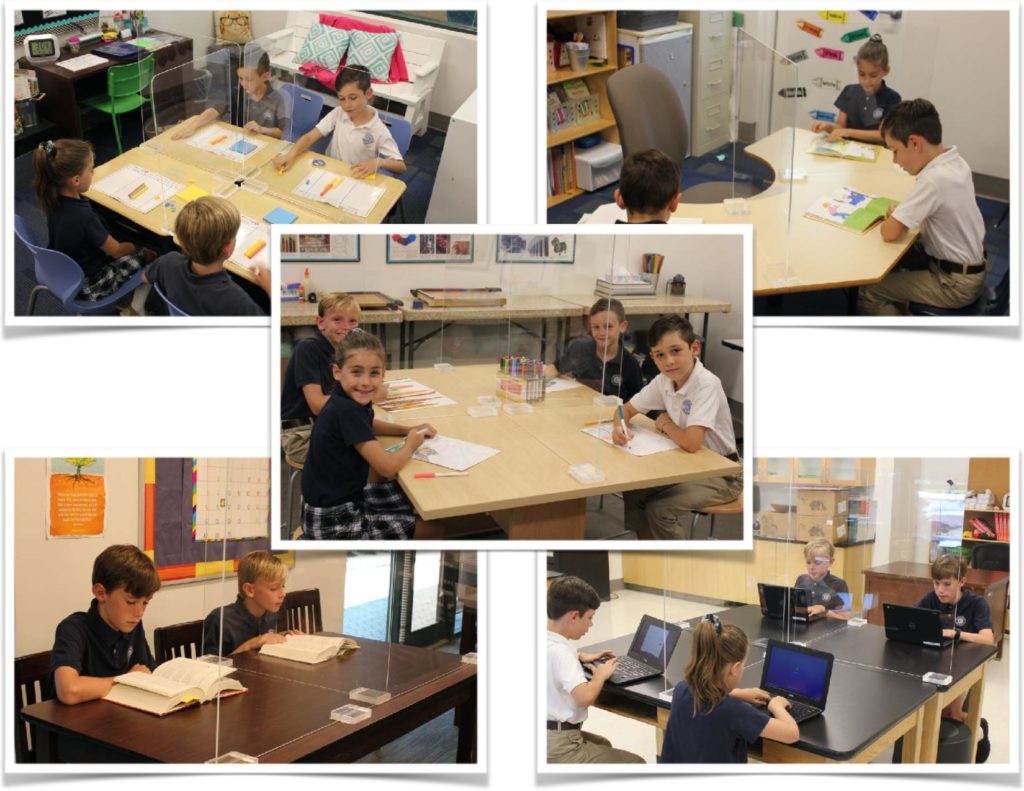
Cornerstone Christian Academy set their first day for August 12. Principal Colin Creel sent a letter to families to the effect that due to Cornerstone’s size and ability to be flexible, Cornerstone will resume a fully in-person instruction model unless forced to go digital. Needed adjustments were announced on July 20. Some main adjustments are listed below.
- Flexibility: This plan is fluid based on current current CDC and American Association of Pediatrics school opening guidelines. The Cornerstone website will be the most current resource.
- Physical Barriers: Cornerstone has made a substantial investment in acrylic panels to minimize the duration of potential exposure for our community instead of requiring students to wear masks within the classroom during instruction.
- Average Class Sizes: Lower School – 14 Middle School – 17
- Synchronous Learning: In the event a student or part of a class is quarantined and the remainder of the class/grade remains in school, we will offer synchronous learning. Synchronous learning means quarantined students would receive the same instruction (as much as possible) as those onsite. Cornerstone purchased numerous iPads for this purpose. In addition, Cornerstone will equip teachers with wireless microphones to ensure proper sound. This option will only be implemented during a partial class quarantine. If the whole class is quarantined, digital learning will be utilized.
- Cleaning: Cornerstone has increased their cleaning budget and protocols. The biggest difference will include disinfectant fogging which will occur at night.
- Visitors: Non-essential visitors will be limited during school hours. All essential visitors must wear face coverings, have their temperature checked and complete a COVID-19 questionnaire prior to entering the building.
“All of the data suggests it is best for students to receive live instruction. We are planning for mini-closures here and there where we would switch to digital learning. Digital Learning will look very similar to last spring. Our principals did an excellent job adapting to meeting the needs of our community. In addition, at the end of the year we gave a survey to our parents to see how we could improve as well as had a live zoom meeting with about 30 parents to receive live feedback as well,” Creel said.
Creel does not underestimate the challenges Cornerstone and others faced and will continue to face in the upcoming school year.
“The biggest challenge we faced was engaging our K-1 students while not imposing too much on the parents. Thus, we piloted a digital learning platform, SeeSaw, with our second grade students in late spring. This platform was amazingly effective. Thus, all of our Lower School teachers have been trained on the platform this summer. Our Middle School already had multiple digital platforms in place,” Creel said.

Wesleyan School is also slated to open August 12 in its Lower and Middle School for their first full day. High school at Wesleyan starts on August 13 for their first full day. This is the intended plan unless other mitigating health and safety concerns arise. They are also offering an entirely virtual option, as well as a hybrid on-campus model adapted to all grades to limit exposure. If you are a Wesleyan family that wants to take advantage of the virtual learning model, indicate your choice by completing the form online no later than Monday, August 3.
“It will be exciting to be together once again on campus this fall; however, we should be realistic that some things will be different. I am confident we can work together as a community to create a school environment that is safe while also providing as much of the Wesleyan experience as possible for you and your children,” said Head of School Chris Cleveland in a Back to School announcement
On June 29, Cleveland released Wesleyan’s detailed distance learning plan that “while it is our hope that we never use this plan, we want to be as prepared as possible to adapt to any scenario.”
Wesleyan families were asked to complete an initial interest survey no later than July 17 to indicate whether they would prefer their child(ren) to begin the school year on campus or in an online blended learning model. Click here for the full Campus Re-Opening Plan.
The hybrid model of on-campus learning at Wesleyan is well-thought out.
Grades K-4 will be on campus in a hybrid model for the first two days of school, August 12 and 13, and then all students in grades K-4 will be on campus beginning Friday, August 14. This means that approximately half of the lower school will report to campus on Wednesday, August 12, and the other half will report on Thursday, August 13. We will provide two identical first day of school experiences to welcome and orient children in smaller groups before all K-4 students will be on campus together on Friday, August 14.
Grade 5 will begin the school year on campus on August 12. Due to their age, the unique transition from lower to middle school, as well as the steep learning curve with new technology, all 5th-grade students will be on campus every day through August 28, at which time this plan will be re-evaluated.
Grades 6-12 will open in a hybrid model on August 12 for students in grades 6-8 and on August 13 for students in grades 9-12. They will divide middle and high school students into two evenly distributed groups, alphabetically by last name to keep families together, and each group will be on campus every other day. The group that is not on campus will connect live into the classroom to stay on-track with their classes and teachers. They will remain in this model for the first two full weeks of school (Friday, August 28) and then re-evaluate the status of the COVID-19 virus in the community and the effectiveness of the health and safety measures we are implementing. It is the goal to have all students on campus as soon as safely possible.
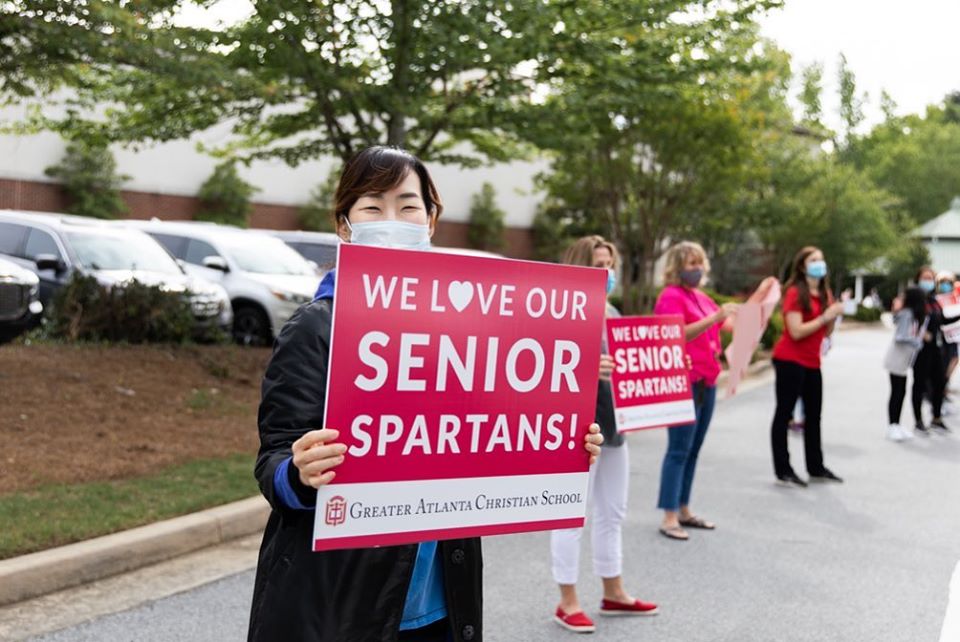
Greater Atlanta Christian School has decided to utilize the extensive technology at its disposal to implement Synchronous Learning, real-time digital learning that allows students at home to fully participate. This will launch August 10, GAC’s official opening day.
Smart cameras, directional microphones, and interactive whiteboards will enable “at-home” students to be more fully integrated into their normal schedule’s real-time classroom, and with their teacher and classmates. The cutting-edge technology offers families on-going flexibility while not compromising on a robust education complete with class collaboration and content sharing.
“So, if a student has to be quarantined because they have been exposed to the virus, then they don’t miss out on the daily interaction with their normal classes. Or, if the family needs to be away from Atlanta, then the student can still have the ability to log in and continue their normal day’s classes. Or, if a student is part of a competition that requires them to be out of town, then they can still be a part of their daily classwork, but later watch the recordings of any classes they have missed,” said Margie Asef, Director of Community Relations.
As the COVID-19 crisis continues, it also provides our families the ability to choose to keep their students home the amount of time they prefer.
“For the past several months, a team of GAC senior leaders, school-level administrators, and lead teachers have been working to transform our K-12 learning spaces so that classes can be taught face-to-face and online, simultaneously,” shared Dr. Scott Harsh in an email to school families last week.
We at Peachtree Corners Magazine will continue to keep you up to date as we continue to receive new information during this time of transition. We wish all students and families in our community a safe, healthy return to school, full of happy and productive learning.
*This article has been updated due to Gwinnett County policy revisions and may continue to be updated.
Source:
Gwinnett County Public Schools
Related
Kelsey Asher is a proud graduate of the University of West Georgia with a Bachelor’s in Communications. She has held a variety of marketing leadership roles for several small, startup companies in a variety of industries including publishing, construction and technology.

Community
Peachtree Corners Festival Awards Debbie Mason Drama Scholarship for 2025
Published
1 week agoon
June 2, 2025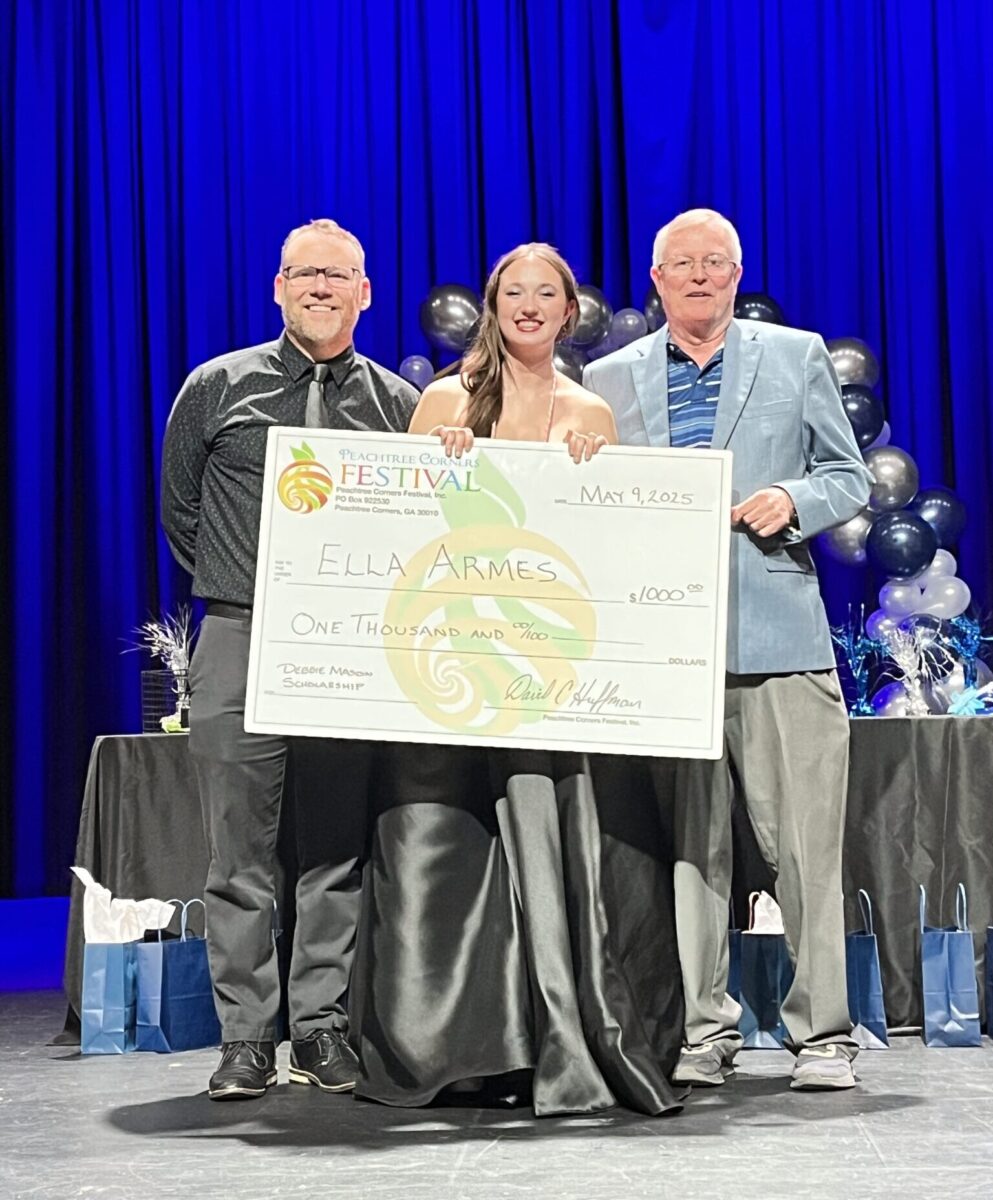
On May 9, the Peachtree Corners Festival awarded the Debbie Mason Memorial Scholarship for Drama to an outstanding Norcross High School drama senior. The recipient was Elizabeth “Ella” Armes, a student who has been involved in the Norcross High School drama department for four years and was most recently the primary stage manager directing the high school’s performances.
According to Terry Gabbard, director of theater at Norcross High School, Ella “was vital to the success of our program. She is an incredible young lady who will be continuing her studies in media and the arts in college.”
In fact, Ella plans to continue her education and work in theater and communications at Kennesaw State University starting this fall.
This marks the third year that the Peachtree Corners Festival has awarded the drama scholarship in the name of the late Peachtree Corners Festival co-founder, Debbie Mason.
In addition to being the first “First Lady” of the city of Peachtree Corners, Debbie and her family were long-time supporters of the drama program at Norcross High School. After her passing in 2023, the Peachtree Corners Festival established the Debbie Mason Memorial Scholarship for Drama as an appropriate way to honor her legacy.
About the Peachtree Corners Festival
The Peachtree Corners Festival is a non-profit, 501(c)(3) volunteer organization dedicated to bringing a safe, wholesome and family-friendly festival to the city of Peachtree Corners each year.
The organization’s goal is to foster community pride and civic involvement, not just through the weekend-long festival, but by giving back and supporting education and beautification initiatives within the city and recognizing deserving members of the community.
This year’s Peachtree Corners Festival will take place on the Town Green, September 20–21.
For more information, visit peachtreecornersfestival.com.
Related
Education
Celebration and Community: ICAGeorgia Wraps Up School Year with Two Festive Events
Published
3 weeks agoon
May 22, 2025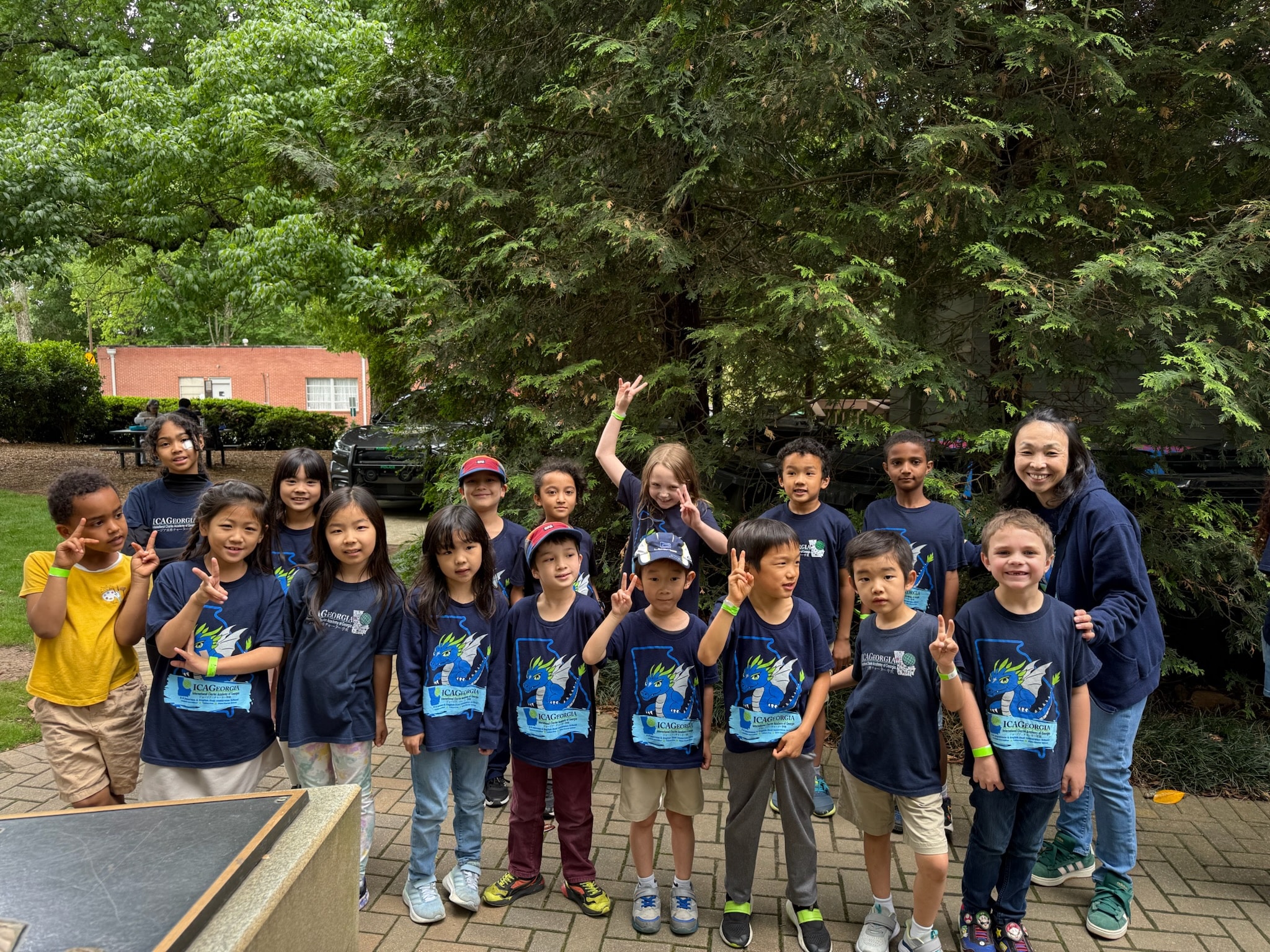
The International Charter Academy of Georgia (ICAGeorgia) recently hosted its third annual Dining with the Scholars event on April 18 — an evening filled with celebration, culture and community spirit.
Held at Canton House in Duluth, the event welcomed over 200 attendees, including students, parents, teachers, board members, local sponsors and special guest, the Consul General of Japan.
Fundraising and performances
The purpose of the event was twofold: to raise funds in support of academic programs for the school and, most importantly, to honor and showcase the outstanding talents and achievements of ICAGeorgia students.

Throughout the evening, guests enjoyed a silent auction, dinner and dessert, as well as a vibrant lineup of student performances, a magic show and live music — creating a truly festive and memorable atmosphere.
“We extend our heartfelt thanks to the many local companies and organizations whose generous sponsorship made this event possible,” said Felecia Tucker-Jones, principal of ICAGeorgia. “[The] support helps us continue to grow and enhance our academic offerings.”

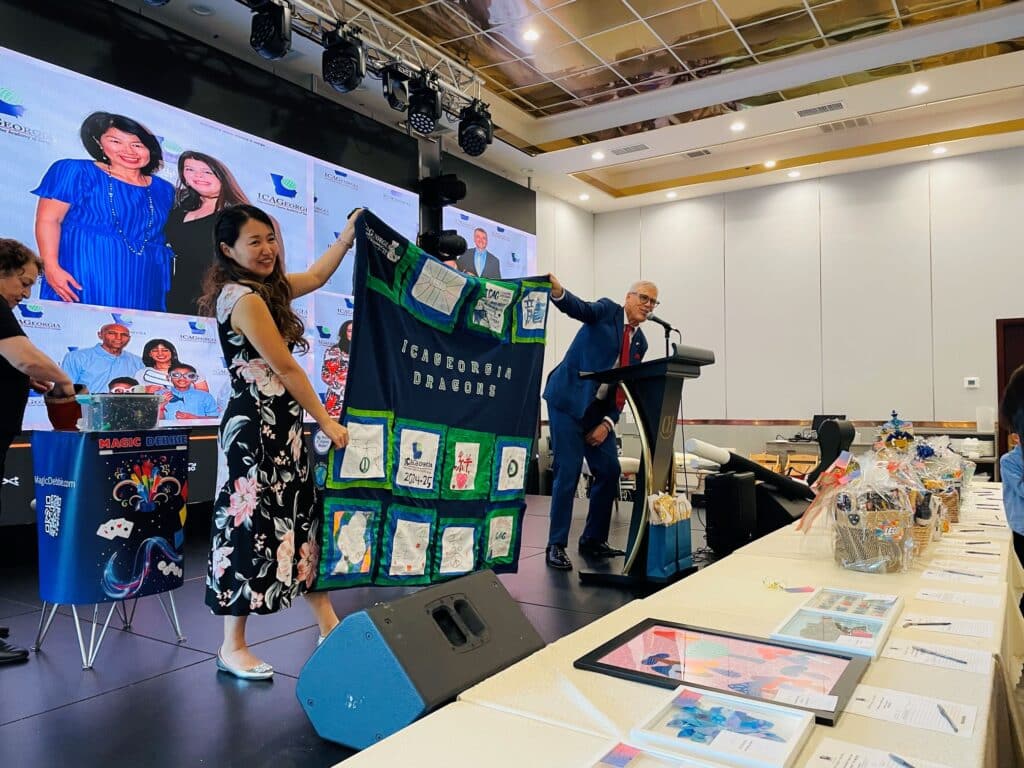
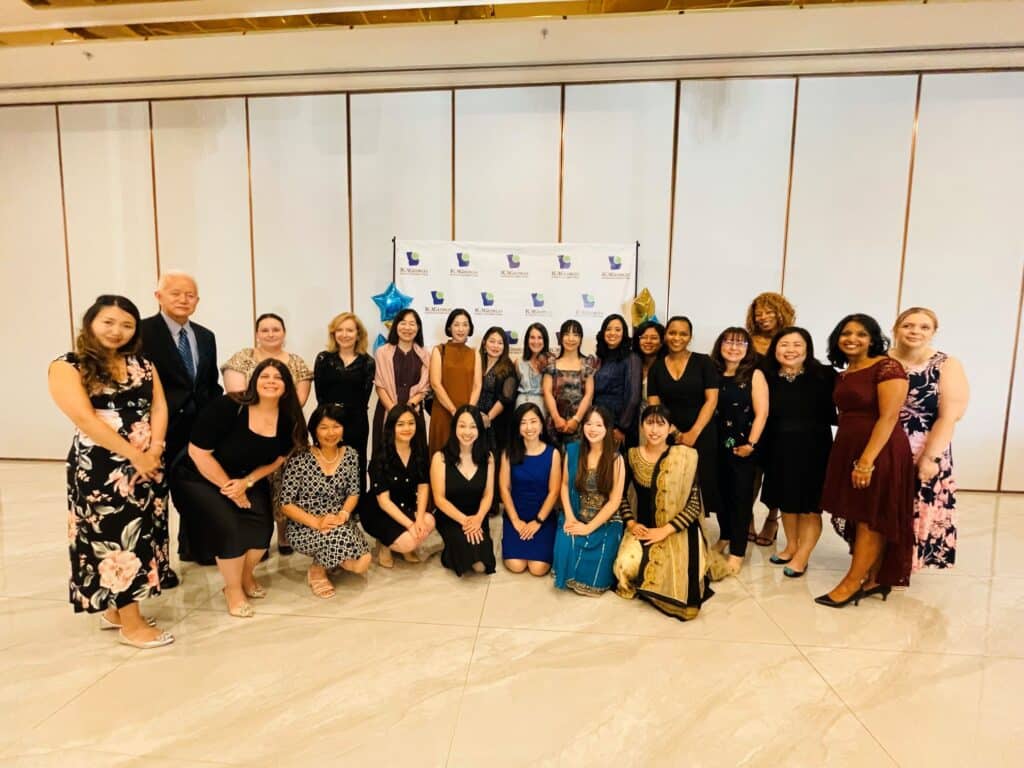

By all accounts, it was a night to remember — and a wonderful reminder of the strong, supportive community that surrounds the school.
Children’s Day Festival
On May 4, students, families and community members gathered at Thrasher Park in Norcross for a vibrant celebration of Children’s Day, a beloved Japanese holiday that honors children’s happiness, growth and well-being.
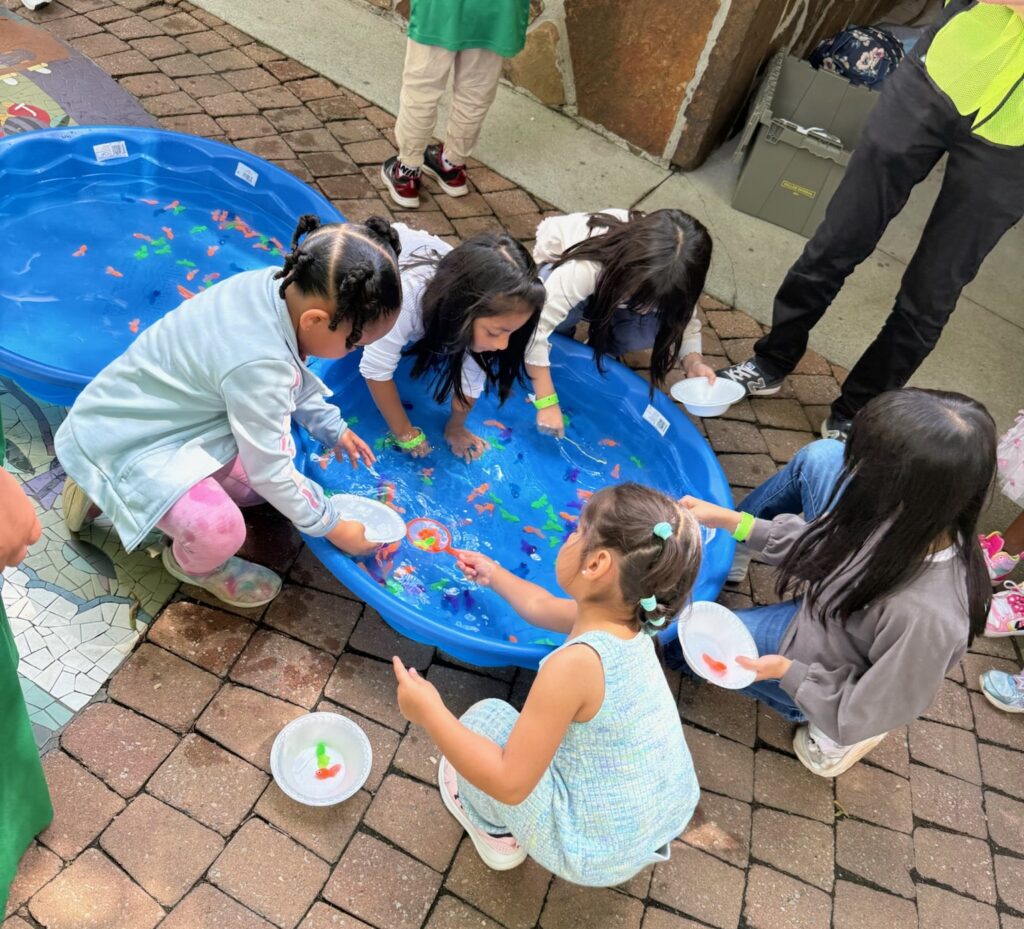
The Japan’s Children’s Day Festival 2025 brought together over 1,000 attendees for a full day of music, crafts, food and cultural experiences.
Visitors of all ages enjoyed traditional Japanese activities such as origami, kingyo sukui (goldfish scooping) and kimono try-ons, while kids played in bounce houses, participated in golf and soccer games and listened to story time in the park.
The festival’s stage was alive with performances from school choirs, dance studios and even a thrilling showcase of breakdancing and karate. Local vendors offered delicious international food — from pizza, tacos and paella to boba and shaved ice — while guests explored artisan booths and even online shopping options.
Culture and community
This festival was a beautiful reflection of cultural pride and community spirit and partnerships, with ICAGeorgia, local small businesses and generous sponsors bringing the vision to life.
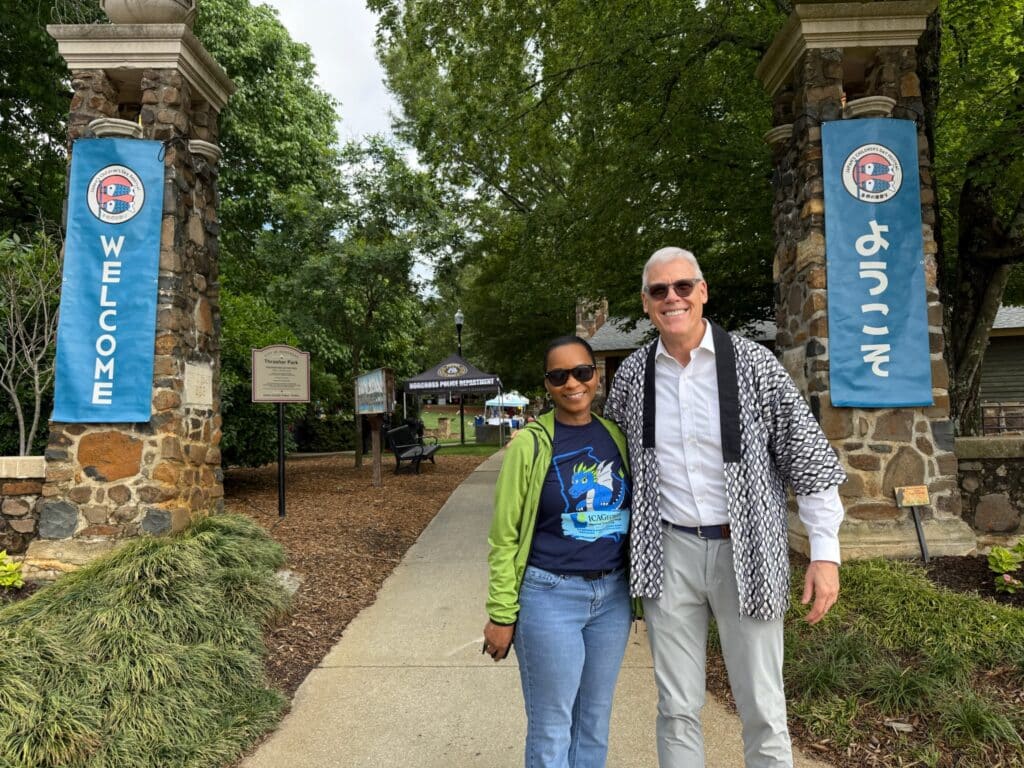
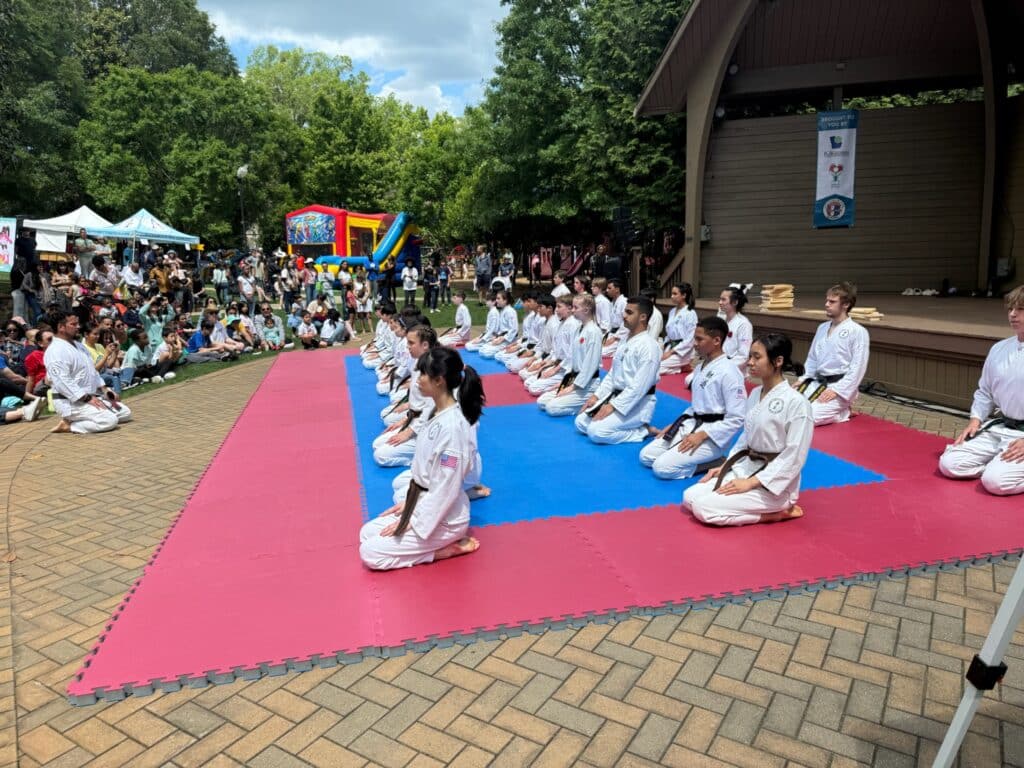
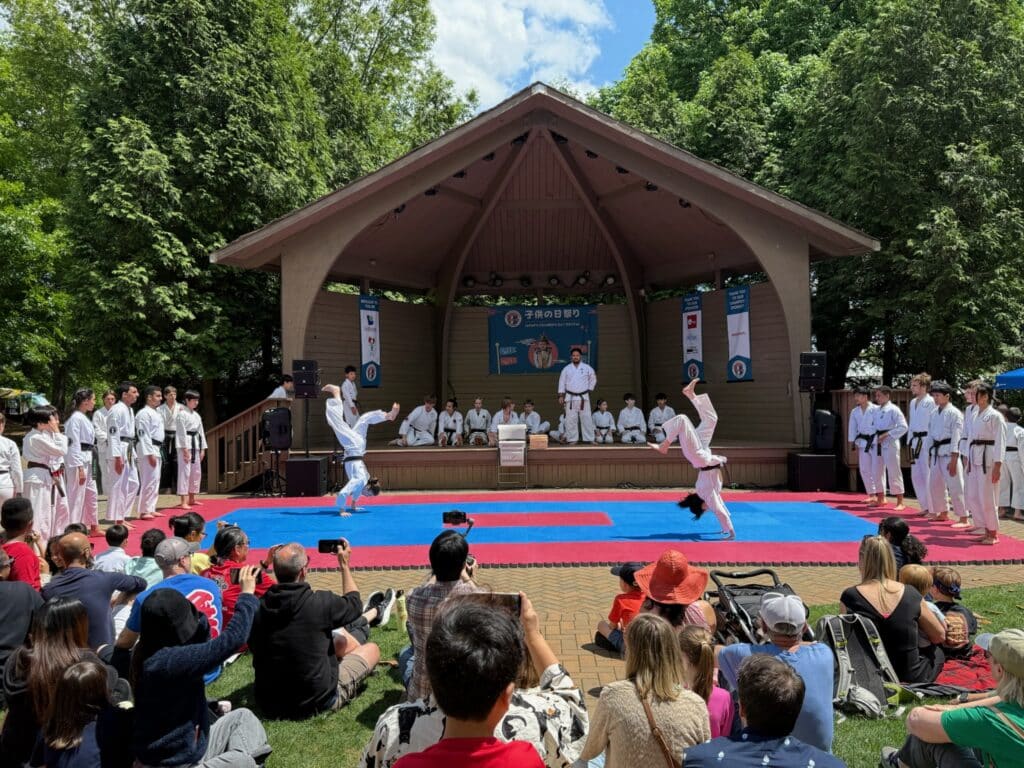

“We’re deeply grateful to all our sponsors, performers, volunteers and families who made the day so special,” said Jeremy Williams, president of the ICAGeorgia PTO.
As Norcross continues to grow as a hub for diverse cultural events, Japan’s Children’s Day Festival stands out as a joyful, family-focused experience with the goal of continuing for years to come.
Follow Japan’s Children’s Day Festival (@JapansChildrensDayFestival) on Instagram and Facebook, and stay tuned for next year’s exciting event.
About ICAGeorgia
The International Charter Academy of Georgia is a statewide charter school available free of charge to any K–6 student residing in Georgia.
Located in Peachtree Corners, the school offers a dual language immersion program in both English and Japanese, a rigorous standards-based curriculum, extracurricular activities and multiple opportunities throughout the year to engage in cross-cultural community.
For more about the school, visit internationalcharteracademy.org.
Related
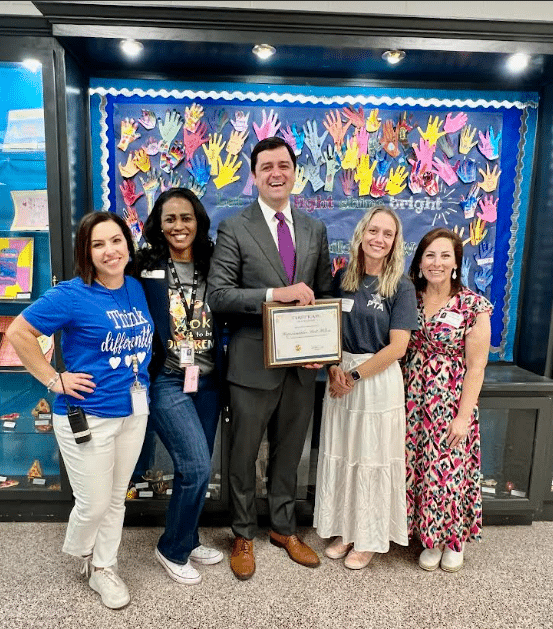
Simpson Elementary School celebrated Exceptional Children’s Week (ECW) last month with five days of special activities to recognize their special needs population and all of their exceptional students.
April 14–18 is set aside each year to celebrate children with disabilities, gifts and talents. This year’s ECW theme was Bridging Gaps and Building Futures, and the school was happy to take part.
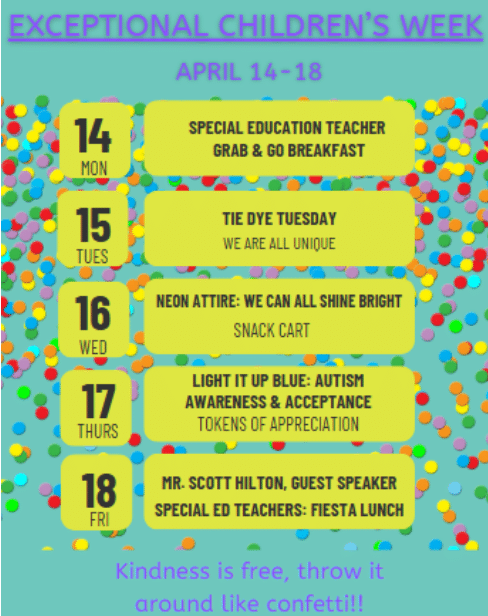
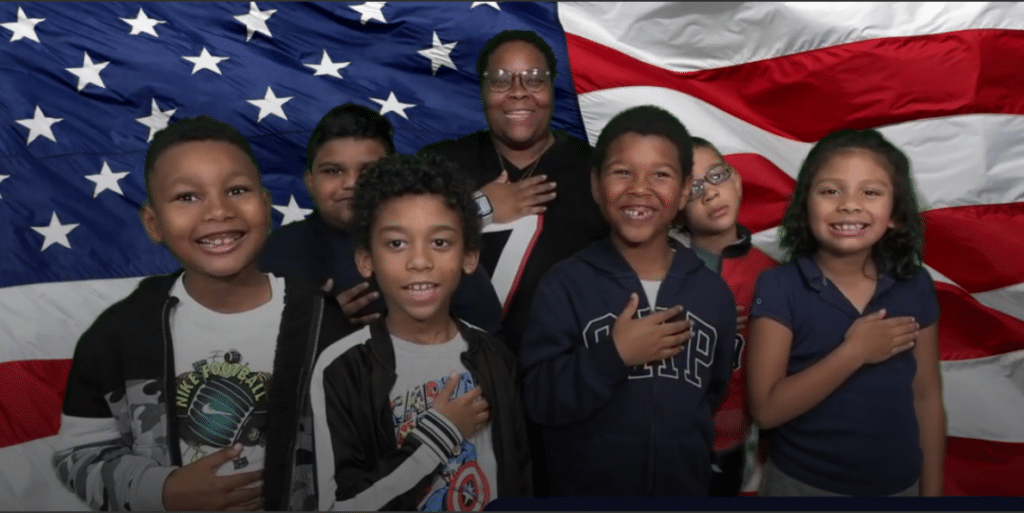
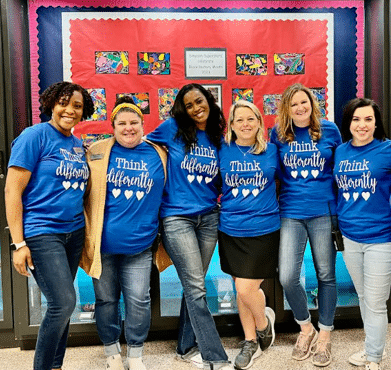
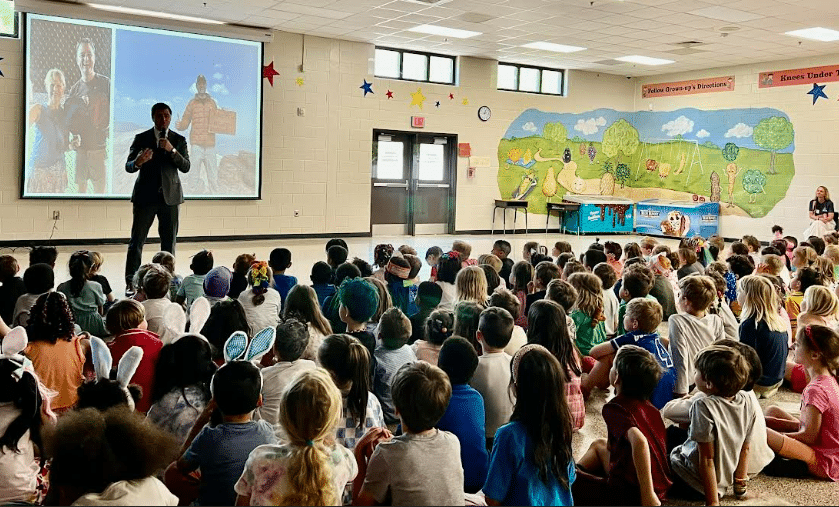
They highlighted each day of the week on the morning news with fun facts about notable people in society — and throughout history — who have overcome challenges with their disabilities, including actor Daniel Radcliffe (who has lived with dyspraxia for his entire life), Tom Cruise, Whoopi Goldberg, Frida Kahlo and Helen Keller.
Simpson Elementary’s technology team also pre-recorded various special needs classes reciting the Pledge of Allegiance every day of the week.
Guest speaker
To end their ECW with a bang, they invited former Simpson Elementary parent, State Representative Scott Hilton, to come in and speak to their K-2 classes about raising his son, Chase (who is autistic and now a student at Norcross High School), and how being different is okay.
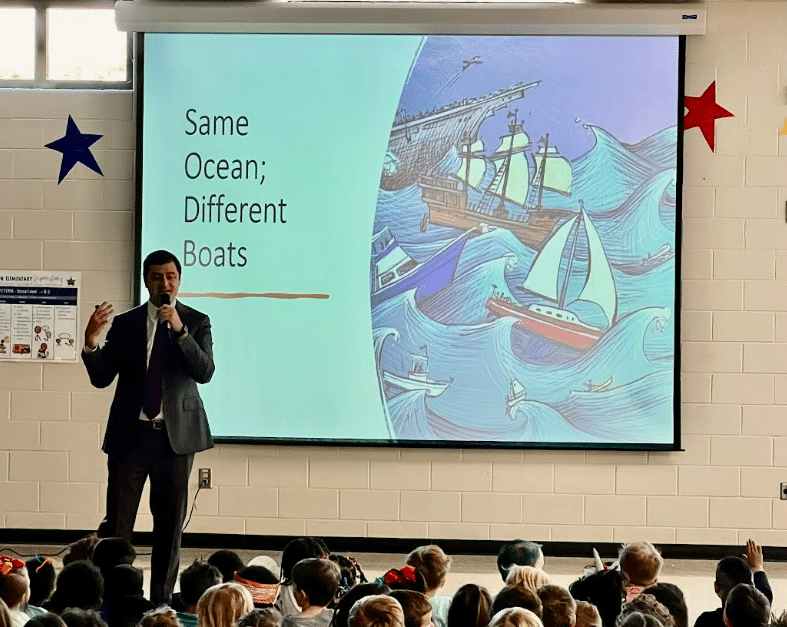
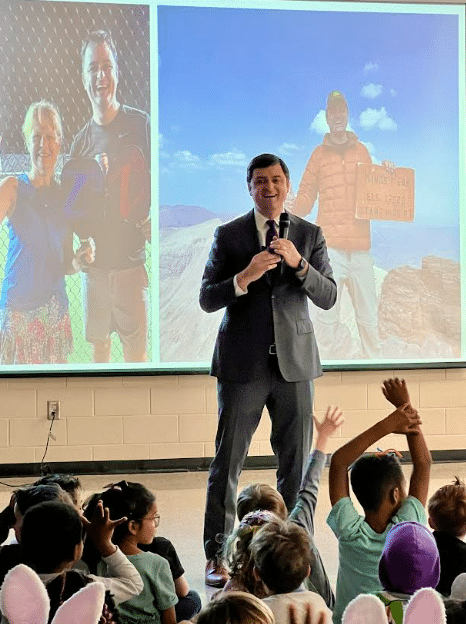
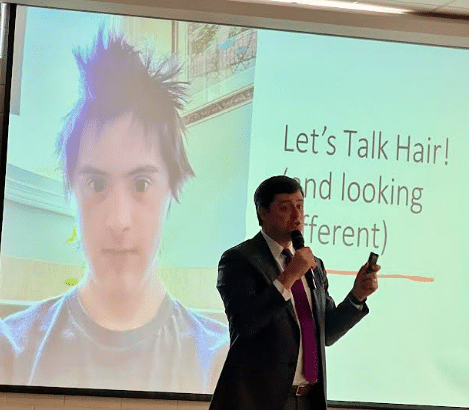
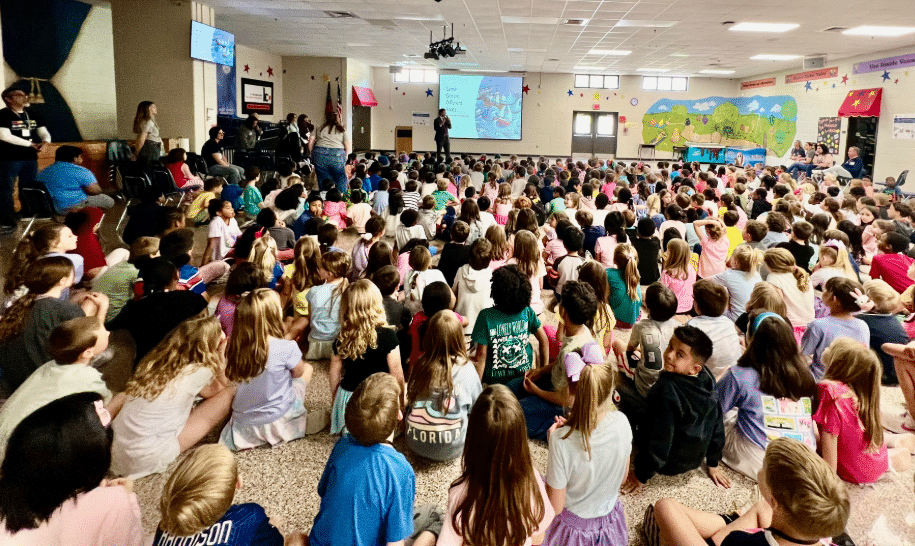
“Showing kindness and being inclusive is the best version of humanity,” said Dr. Taffeta Connery, Simpson Elementary School principal, in a statement about the event.
“Simpson Elementary has a special needs population of 214 (23%) of 946 students. [And] … we strive to ensure that our students are valued, recognized and instilled with high expectations for all.”
For more about Simpson Elementary, visit simpsones.gcpsk12.org.
Related
Read the Digital Edition
Subscribe
Keep Up With Peachtree Corners News
Join our mailing list to receive the latest news and updates from our team.
You have Successfully Subscribed!

“Geek Culture” Shines at 2025 MomoCon

Vox-Pop-Uli Launches RED Initiative for Veterans’ Support

From Zero to Accredited: Dunwoody’s Billy Grogan on Starting a City Police Department [Podcast]

City Collaborates with DNR for Deer Overpopulation Solutions

More Than Badges: Why Community Culture Drives Great Policing [Podcast]

The PCBA Awards $500 to Light Up The Corners at After-Hours Event

The City and PCBA Welcome Ride Lounge with Ribbon Cutting Ceremony

Peachtree Corners Festival Awards Debbie Mason Drama Scholarship for 2025

Eric Christ: Upcoming Elections Update

The Forum Welcomes [solidcore] with June 7 Grand Opening

More Than Badges: Why Community Culture Drives Great Policing [Podcast]

The City and PCBA Welcome Ride Lounge with Ribbon Cutting Ceremony

From Zero to Accredited: Dunwoody’s Billy Grogan on Starting a City Police Department [Podcast]

Mustache The Band Set to Play the VoxStage on June 14

City Collaborates with DNR for Deer Overpopulation Solutions

Peachtree Corners Festival Awards Debbie Mason Drama Scholarship for 2025

Light up the Corners [Video]

Capitalist Sage: Business Leadership in Your Community [Podcast]

Cliff Bramble: A Culinary Adventure through Italy

Top 10 Brunch Places in Gwinnett County

A Hunger for Hospitality

THE CORNERS EPISODE 3 – BLAXICAN PART 1

Top 10 Indoor Things To Do This Winter

The ED Hour: What it takes to Remove Barriers from Education

Peachtree Corners Life
Topics and Categories
Trending
-
Podcast5 days ago
From Zero to Accredited: Dunwoody’s Billy Grogan on Starting a City Police Department [Podcast]
-
Podcast4 days ago
More Than Badges: Why Community Culture Drives Great Policing [Podcast]
-
Business5 days ago
The City and PCBA Welcome Ride Lounge with Ribbon Cutting Ceremony
-
Fitness3 days ago
The Forum Welcomes [solidcore] with June 7 Grand Opening








